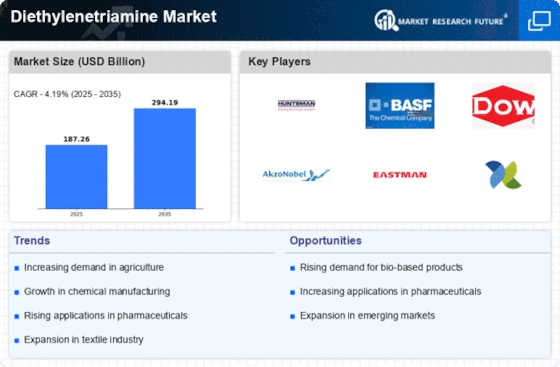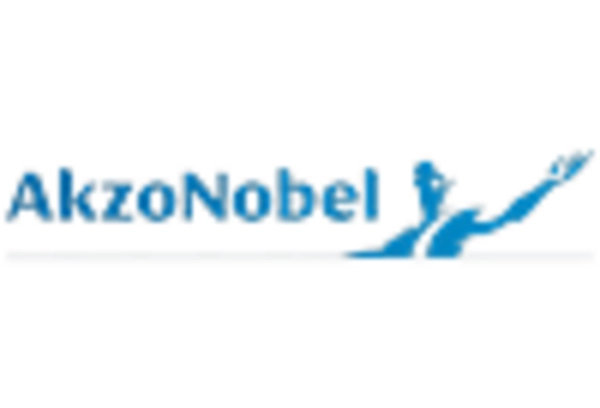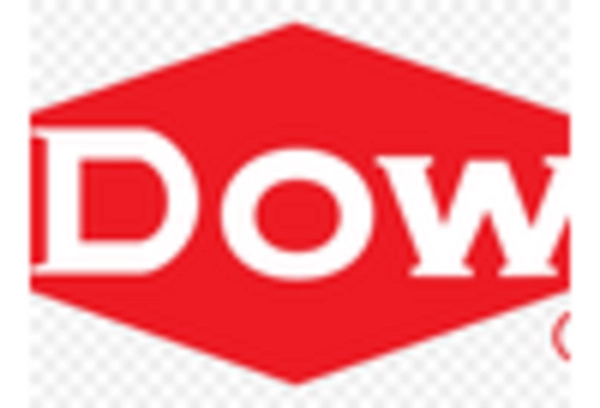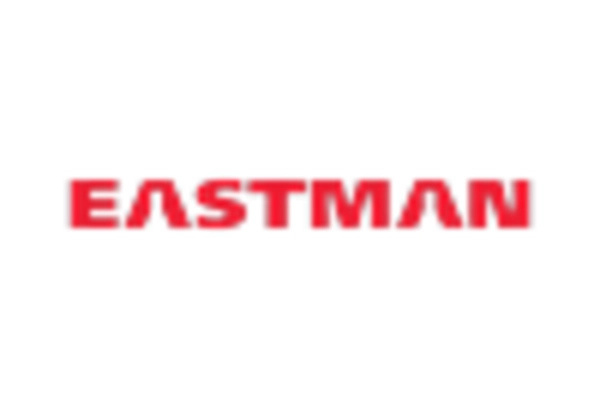Market Share
Diethylenetriamine Market Share Analysis
In the competitive landscape of the Diethylenetriamine (DETA) Market, companies employ a variety of strategies to establish a strong market presence and capture a significant share. This versatile chemical compound finds applications in diverse industries, including adhesives, coatings, and agrochemicals, necessitating a comprehensive approach. Here's a breakdown of key market share positioning strategies adopted by players in the DETA Market, presented in a concise pointer format:
Capacity Expansion and Production Efficiency:
Scaling Production Capacities: Companies invest in expanding production capacities to meet the growing demand for Diethylenetriamine. Ensuring a robust supply chain through increased production capacity is crucial for capturing market share.
Efficient Manufacturing Processes: Implementing efficient production processes and technologies contributes to cost optimization. Streamlining manufacturing workflows enhances production efficiency, allowing companies to offer competitive pricing in the market.
Application Diversification:
Versatile Formulations: Offering Diethylenetriamine in various formulations suitable for different applications, including epoxy curing agents, chelating agents, and fuel additives, allows companies to cater to a broad range of industries. A diverse product portfolio enhances market penetration.
Customized Solutions: Developing customized formulations based on specific industry needs fosters customer loyalty. Tailoring DETA solutions to meet unique requirements in different sectors strengthens market positioning.
Geographical Expansion:
Strategic Global Presence: Expanding market reach by strategically entering key geographical regions with high demand for DETA is essential. Understanding regional variations in regulations, industry practices, and consumer preferences allows companies to tailor their products effectively.
Local Partnerships: Forming partnerships with local distributors, manufacturers, or research institutions aids in navigating regional nuances efficiently. Local collaborations enhance market penetration and provide insights into specific market requirements.
Quality Assurance and Regulatory Compliance:
Adherence to Quality Standards: Prioritizing stringent quality control measures ensures the production of high-quality Diethylenetriamine. Companies that adhere to industry quality standards and certifications enhance their market credibility, fostering customer trust.
Regulatory Compliance: Staying informed about and compliant with global regulatory requirements, including safety and environmental standards, is crucial. Companies that navigate regulatory challenges seamlessly position themselves as reliable suppliers in the DETA Market.
Cost Competitiveness and Operational Excellence:
Cost Optimization: Implementing cost-effective production processes and supply chain management helps companies maintain competitive pricing. Achieving cost competitiveness is vital in a market where price considerations significantly influence customer choices.
Operational Efficiency: Striving for operational excellence through streamlined processes, energy efficiency, and waste reduction enhances overall production efficiency. Efficient operations contribute to maintaining competitive pricing and meeting market demands.
Sustainability Initiatives:
Eco-Friendly Production Practices: Responding to the increasing demand for sustainability, companies focus on adopting eco-friendly production practices for DETA. This includes initiatives such as using renewable energy sources, reducing waste, and implementing green manufacturing technologies.
Bio-Based DETA: Developing bio-based or renewable DETA aligns with sustainability goals and appeals to environmentally conscious consumers. Companies investing in green alternatives position themselves as leaders in sustainable chemical manufacturing.
Customer Relationship Management:
Proactive Customer Engagement: Establishing proactive communication channels with customers helps companies understand their needs and concerns. Proactive engagement fosters strong relationships, and companies that actively listen to customer feedback can adapt their strategies to evolving market demands.
Supply Chain Collaboration: Collaborating closely with customers in the supply chain enhances operational efficiency. Timely and transparent communication regarding product availability, deliveries, and order fulfillment contributes to customer satisfaction.
Research and Development Focus:
Innovative Formulations: Companies invest in ongoing research and development to create innovative formulations and applications for DETA. This includes exploring new uses, improving performance characteristics, and staying ahead of technological advancements.
New Product Development: Introducing new DETA-based products that address emerging industry needs contributes to market differentiation. Being at the forefront of innovation enhances a company's reputation and market positioning.
Strategic Acquisitions and Collaborations:
Acquisition of Complementary Businesses: Acquiring businesses that complement the DETA market, such as companies specializing in related chemicals or downstream applications, helps diversify product offerings and strengthen market presence.
Research Collaborations: Forming collaborations with research institutions or technology providers can lead to shared development initiatives or joint ventures. Collaborative ventures enhance overall market positioning through shared knowledge and expertise.


















Leave a Comment